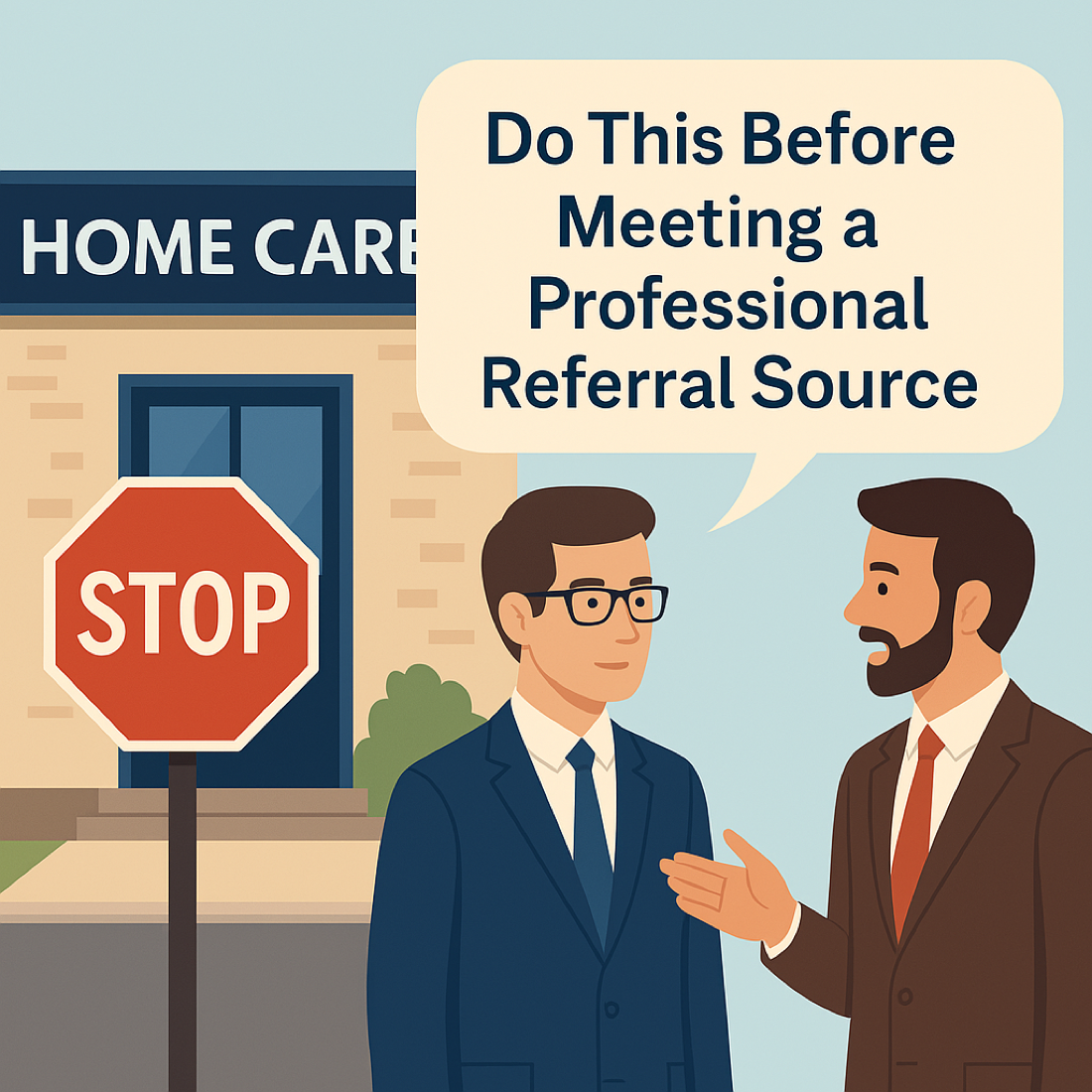
8 Things You Must Do Before Meeting a Professional Referral Source (or Risk Wasting Your Time)
You wouldn’t walk into an important meeting unprepared, right? Well, the same goes for meeting a professional referral source. Whether it’s a hospital, a doctor’s office, or a social worker, you need to show up ready if you want them to take you seriously.
The thing is, referrals aren’t handed out freely anymore. Competition is tough, and referral partners expect proof, professionalism, and follow-through. If you’re still using old-school tactics like dropping off a stack of brochures and hoping for the best, you’re wasting your time.
So, before you even step foot in that office, make sure you’ve handled these seven things. Get them right, and you’ll stand out in a way that makes referral sources keep wanting to work with you.
1. Be Clear on What Makes You Different

Before you talk to any professional referral source, ask yourself: Why would they choose my agency over someone else’s?
-
Do you specialize in a specific type of care (like dementia or post-surgery recovery)?
-
Have you helped reduce hospital readmissions for clients?
-
Can you prove that your caregivers stay longer than the industry average?
Professional referral sources care about results, not promises. So instead of saying, “We provide great home care,” say something like:
“Our caregivers help keep patients out of the hospital. In the last six months, 92% of our clients have avoided readmission.” Numbers matter. Be specific.
2. Know Their Pain Points Before You Walk In
A hospital discharge planner, a rehab center, and a senior living facility all have very different needs. If you walk into a meeting with the same generic pitch for everyone, you’ll lose them fast.
-
Hospitals care about reducing readmissions and keeping patients safe at home.
-
Doctors’ offices want patients to get support so they don’t keep coming back with the same issues.
-
Rehab facilities need to know that your team can help patients stick to recovery plans at home.
Find out what matters to your professional referral source, and lead with that.
3. Have Success Stories Ready

People remember stories. If you want to make a real impact, come prepared with examples of how your agency has helped others.
Instead of saying, “We offer 24/7 care,” share something real like:
“One of our clients, an 82-year-old stroke survivor, was readmitted to the hospital twice before her daughter called us. We put together a care plan, provided daily PT support, and she hasn’t been hospitalized since.”
That’s powerful. That’s memorable. That’s the kind of thing that makes referral sources trust you.
4. Bring Proof, Not Just Promises
Every home care agency claims they provide quality care. But what actual proof do you have?
-
Client satisfaction scores (How many families would recommend you?)
-
Caregiver retention rates (Do you keep good caregivers, or are they always quitting?)
-
Patient outcome data (Do your clients stay out of the hospital?)
Professional referral sources have been burned before by agencies that overpromise and underdeliver. If you can back up your claims, you instantly set yourself apart.
5. Anticipate and Address Their Concerns
Referral sources may have reservations about working with a new home care agency. Be prepared to address potential objections such as:
-
“How do I know your caregivers are qualified?” → Share your hiring, training, and background check process.
-
“What if my patient needs 24/7 care?” → Explain your on-call services and emergency response capabilities.
-
“What makes your agency different from others?” → Reinforce your unique strengths with evidence-based examples.
6. Make It Easy for Them to Refer Clients

Nobody wants extra work. If sending you referrals feels complicated, busy professionals won’t bother.
-
Do you have a simple referral form they can fill out?
-
Can they send a quick email or text instead of making a phone call?
-
Do you have a dedicated contact person for referrals?
The easier you make it, the more referrals you’ll get. Don’t make them chase you.
7. Don’t Just Show Up Once, Follow Up the Right Way
One meeting isn’t enough to build a strong referral relationship. Follow-ups matter. So, the key here is to not just check in to ask for referrals.
-
Share updates on past referrals (“The patient you sent us last month is doing great. We helped arrange her transportation to therapy, and she’s making great progress.”)
-
Offer something valuable (“I found a great resource on post-surgical care that your patients might find helpful. I’d love to share it with you.”)
-
Stay visible without being annoying. A quick email, an occasional in-person drop-in, or even commenting on their LinkedIn posts can keep you top of mind.
Relationships drive referrals. Stay connected.
8. Focus on Helping Them First, Not Getting Referrals

If you take one thing from this article, let it be this: Make it about them, not you.
Professional referral sources don’t care about your business goals. They care about their patients and clients. Instead of asking, “Can you send us referrals?”, ask:
-
“What challenges are you facing with patient follow-up? Maybe we can help.”
-
“What do you wish home care agencies did better? We’d love to improve.”
The best agencies don’t just ask for referrals; they become a valuable resource. And when you help people, they remember you.
Final Thoughts
Referrals are not given lightly. Every time a professional referral source sends someone your way, they are putting their reputation on the line. They need to be sure that you are not just another home care agency looking for business but a trusted partner who delivers real results.
The agencies that build strong referral networks are not the ones with the flashiest pitches. They are the ones that show up prepared, understand the needs of their referral partners, and follow through on what they promise. They focus on helping first, knowing that when they do, referrals will come naturally.
Approach every meeting with the mindset of building something lasting. Make it easy for professional referral sources to trust you, and they will keep sending clients your way.
Now, before you walk into your next meeting, are you truly ready?